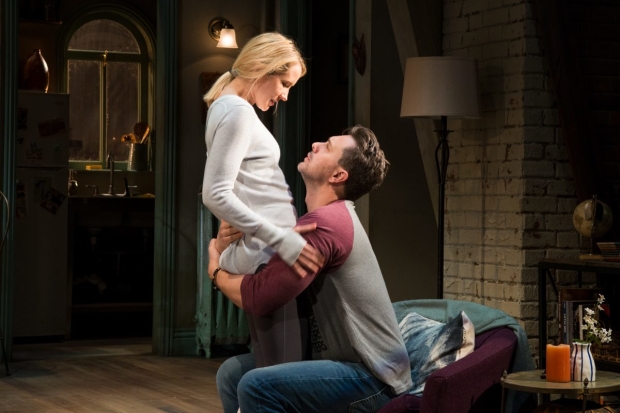A Marriage on the Verge in Belleville

(© Philicia Endelman)
Amy Herzog's thriller Belleville benefits from solid direction by Jenna Worsham and stellar performances by its leads, Anna Camp and Thomas Sadoski. The play itself makes quizzical choices and contains creaky plotting, but the actors invest so much in their roles that the audience members at Pasadena Playhouse wind up on the edge of their seats nevertheless.
Zack (Sadoski) and Abby (Camp) attempt to settle down in a foreign city after a traumatic past few years. Abby's mother's death has ripped her apart, and her behavior has become erratic upon going off her antidepressants cold turkey. The audience knows within the first 20 minutes that their marriage is on tenuous ground based on Abby's extreme reaction to Zack's activities and how their separate conversations with their landlord (Moe Jeudy-Lamour) are vastly inconsistent. Their constant lies strangle the love they may have had in the past, and they have grown to resent each other. But how far will that bitterness go?
Herzog's script works overtime shoving an intimate tragedy into the suspense genre. The characters' actions suggest a drawing-room thriller that never comes because Belleville's situation leans more toward Edward Albee than Alfred Hitchcock. These are pitiable characters, not unhinged monsters, but the script continues to hint at red herrings that go nowhere, particularly pertaining to a hidden cell phone, a gargantuan bread knife, and a mysterious female caller. Herzog also brings in two characters, the landlord and his frustrated wife (Sharon Pierre-Louis), who become stressors for the already precarious protagonists, but feel superfluous to the story. Keeping the play to two characters would have added to the claustrophobia. There's also a motif about babies that seems to be significant to the playwright only to vanish without shedding light on Abby's state of mind. The play's coda, spoken completely in French, only confused and drained the energy from the final scene with the protagonists.
All four performances are entrancing. The audience feels their exasperation, rage, and consternation throughout the tense evening. Camp's manic energy bubbles just below the surface. Sadoski almost grovels before Camp with an eagerness to be loved that informs his performance. Pierre-Louis and Jeudy-Lamour project the terror of a couple with a newborn stuck catering to two unstable virtual strangers in their apartment building.
Worsham preserves the humanity in the characters so that even when the play strays, the audience is rewarded by the performances. Some of those red herrings are so effective, and therefore so aggravating when the script doesn't follow through, because Worsham puts great emphasis on them, particularly the knife that looks more apt to kill Godzilla than slice a baguette. If given a proper thriller to direct in the future, Worsham's taut sense of tension could have the audience pulling out its hair in fright.
Sara Ryung Clement's costume design takes casual clothing, like a hoodie and a playful sleeveless dress, and turns them into weapons of a deteriorating marriage. David Meyer's set is instantly identifiable as Parisian, with its teal and eggshell-white coloring and angular ceilings. The set also tightens the stage size to box in the characters.
The script for Belleville asks more questions than it answers. Had Herzog trusted her two protagonists' toxic dynamics to captivate the audience, it would have been a more rewarding tale. Instead, the talented company is left chasing after the play, trying to build suspense without the text leading them to a fulfilling conclusion.










